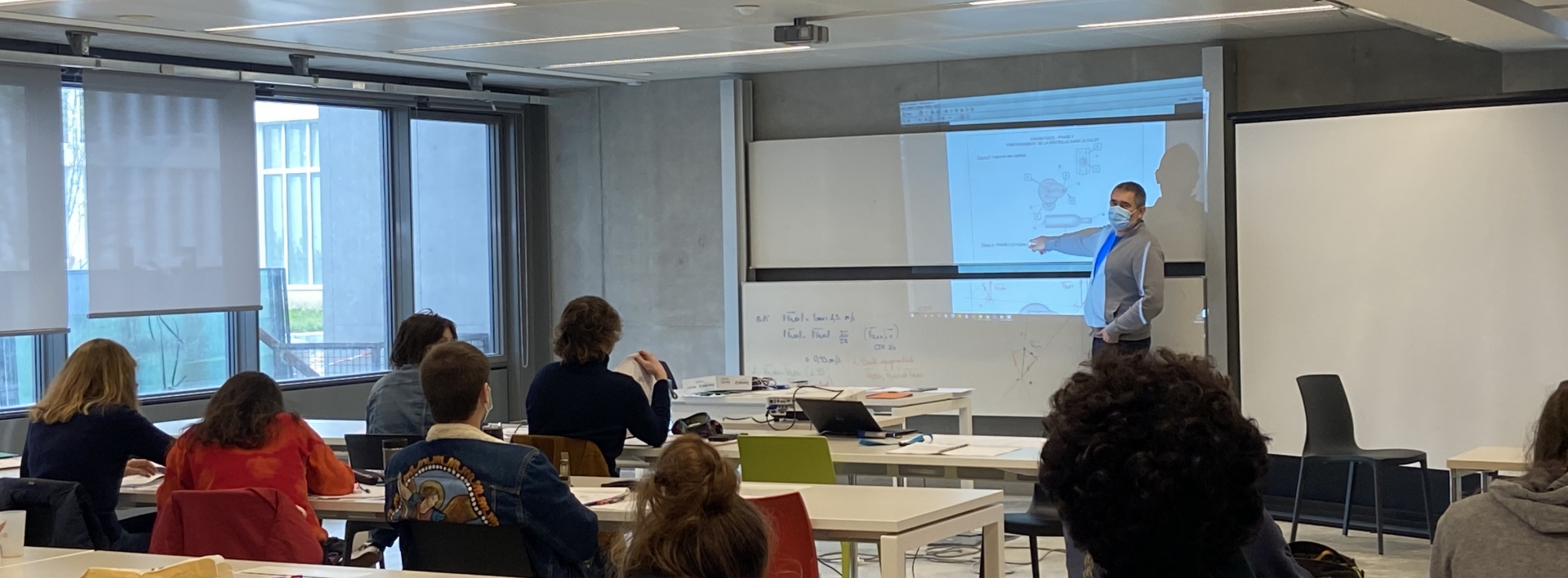Teaching
Masters
M2 Mechanics of Materials for Engineering and Structural Integrity
Department of Education and Research Mechanical Engineering
The Master 2 Mechanics of Materials for Engineering and Structural Integrity (MAGIS) is a course in the mechanics of materials and structures. It aims to establish the relationships between the process, the material, its microstructure and its mechanical properties for advanced industrial applications and innovative processes. A general approach to solid mechanics is presented, which applies to a wide variety of materials (metals, ceramics, glasses, composites, polymers, foams, shape memory alloys, etc.) in order to understand dimensioning under complex loading (3D, quasi-random, anisothermal, multi-physics, etc.).
Students are trained in scientific methodology, including experimental characterisation using state-of-the-art tools, the simulation of the mechanical behaviour of structures, and the understanding and modelling of deformation mechanisms and couplings between the various phenomena at work.
(MS)2SC - Modelling and Simulation in Structural Mechanics and Coupled Systems
Department of Education and Research Mechanical Engineering
Mechanics, Energy and Processes Department
The Master 2 "Modelling and Simulation in Mechanics of Structures and Coupled Systems" (MS)2SC is a training through research, both practical and theoretical, in advanced techniques in Modelling and Simulation of Structures and Complex Mechanical Systems.
The Master's degree aims to provide the theoretical, mathematical, numerical, computational and software modelling bases for this broad field, enabling the understanding and optimisation of concrete problems related to the dimensioning and virtual design of complex mechanical systems. Through a research internship carried out in an academic laboratory or industrial research centre, but also with the help of projects accompanying the courses, the training aims to teach students a scientific work methodology allowing them to stand back and be autonomous, and to test their capacity and possible interest in pursuing a thesis in the field.
The variety of courses taught by academic and industrial partners allows students to follow a truly personalised path in the fields covered by the master's degree: modelling, simulation, structural calculation, applied mathematics, coupled problems and interactions, multi-scale and multi-physics parallel strategies, wave dynamics and propagation, vibration study and control, model reduction, massive data, test-calculation interaction, model control, verification and validation, inverse problems, optimisation, non-linear problems, damage and breakage, composite materials, hazards and probabilistic modelling...
MS - Materials and Structures
Department of Education and Research in Civil and Environmental Engineering
The objective of the Master 2 "Materials and Structures", a research-oriented course, is to acquire scientific autonomy in the field of Civil Engineering with a significant opening towards the environmental implications. Expertise and continuity of knowledge from the material (cement or other) to the structure is thus acquired during this year of training through research-based training. Particular attention is paid to the behaviour of civil engineering materials (concrete, soils, etc.) and structures under extreme conditions that exceed regulatory requirements. Fine modelling and the coupling of the numerical and experimental approach are at the heart of the training and are based on the research base of the supporting institutions.
Envelope and Sustainable Construction
Department of Education and Research in Civil and Environmental Engineering
The Master's degree "Envelope and Sustainable Construction" is a course offering a complete and adapted training to future researchers and designers.
This course focuses on the control of energy, comfort and the envelope.
It provides a body of knowledge on the interactions between the building envelope and the internal and external environments (microclimate, hygro-thermal comfort, etc.)
The current importance of environmental aspects has led to the creation of modules exploring the notion of energy balance and sustainable development on a local and global scale.
Geomechanics and Underground
The "Geomechanics and Subsoil" master's degree is research-oriented, but can be followed by two audiences: on the one hand, students from engineering schools whose original training aims at integration into industry, and on the other hand, students from universities, in France or abroad, who have followed a more disciplinary course. A common objective of these two categories is the acclimatisation of students to the world of research and more precisely to the functioning of the scientific community and to the life of laboratories. The aim is to master modern methods of analysis and modelling in the fields of geomechanics and geoengineering, with a significant opening towards the environmental implications. The following themes constitute the basis of the training: behaviour of (geo)-structures and civil engineering materials and the specific phenomena that concern them (uncertainties, multi-physical couplings, soil-structure interaction, wave propagation, various loads, etc.) as well as natural hazards.
